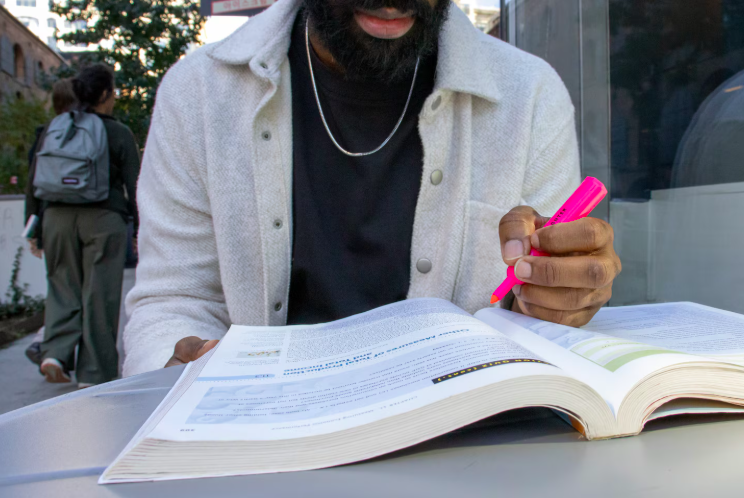Get tales like this delivered straight to your inbox. Join The 74 E-newsletter
Earlier than beginning at his Harlem highschool, Jeurry all the time assumed he was progressing appropriately at school, regardless of having vital studying challenges.
Nevertheless, in his freshman 12 months, he started to note himself struggling to learn longer phrases and extra advanced sentences.
As he grew more and more overwhelmed, it grew to become clear that the small courses completely for college students with disabilities that he had been in since kindergarten had not adequately ready him for highschool.
Nonetheless, Jeurry managed to move practically all his courses. His closing assembly along with his Committee on Particular Schooling — which consisted of Jeurry’s mother and several other college members — came about in December 2016. By then, the senior had earned 45 credit — 44 have been required to graduate — and a C+ common, data present.
However Jeurry was devastated to study that he wouldn’t earn a diploma.
The explanation was primarily based on a choice the committee made when Jeurry was in sixth grade and, in line with data, by no means revisited whereas he was in highschool. At the moment, the educators concluded that Jeurry couldn’t study grade-level curriculum. They determined he can be “alternately assessed,” or evaluated primarily based on decrease achievement requirements. New York State college students who take alternate assessments by highschool can’t earn a diploma, a prerequisite for army service, many roles, and most degree- or certificate-granting school and commerce faculty applications.
Heartbroken, he begged the college to discover a answer through the 2016 assembly. “They didn’t even care,” Jeurry mentioned. “They simply wished me to ‘graduate’ and get out.”
Jeurry, who’s now 26 and was identified with a light mental incapacity after graduating highschool, requested that his final title be withheld over considerations in regards to the stigma surrounding mental disabilities.
Particular training advocates say the systemic failures that led to Jeurry’s state of affairs eight years in the past proceed to jeopardize the futures of comparable college students. Final faculty 12 months, 6,116 New York Metropolis college students took the New York State Alternate Evaluation, in line with state information. Federal legislation requires that states provide such assessments for college students with disabilities who’re incapable of taking state exams. Importantly, it additionally states that solely “college students with essentially the most vital cognitive disabilities” can take the alternate evaluation, and that colleges should totally inform mother and father of the potential ramifications. (State training departments are chargeable for making certain compliance with these mandates.)
Too usually, nonetheless, these requirements are neither maintained nor enforced, particular training advocates, lecturers, and households informed Chalkbeat. As a substitute, components like under-resourcing, nebulous procedures, and a failure to equip mother and father to make totally knowledgeable choices have led colleges to put some college students with out vital cognitive disabilities on a non-grade-level, non-diploma observe. College students who take alternate assessments are usually positioned in non-inclusive, low-rigor settings, which might deprive them of educational and socialization alternatives.
On the December 2016 assembly, the members of Jeurry’s particular training committee mentioned their fingers have been tied. In response to documentation from the assembly, Jeurry’s mom mentioned “she was not made conscious of the long-term results of alternate evaluation when it was first initiated or throughout any supplemental [meetings].”
“They might all the time inform my mother, ‘His diploma goes to be actual,’” Jeurry mentioned. “She stored believing them.”

In response to requests to interview state particular training management, a New York State Schooling Division spokesperson mentioned in an electronic mail: “NYSED is dedicated to working with colleges and oldsters to find out the suitable participation of scholars with disabilities in [the alternate assessment] and to totally perceive the impression it has on these college students.”
Since New York’s alternate evaluation is used to fulfill federal particular training legislation necessities, the spokesperson mentioned, “there are very strict standards for its growth, administration, and applicability to college students.”
Christina Foti, town Schooling Division’s deputy chancellor for inclusive and accessible studying, acknowledged that there’s room for extra strong safeguards, and she or he mentioned the Schooling Division not too long ago really useful that the state contemplate a number of alternate assessment-related coverage adjustments. They embody clarifying definitions and participation standards, requiring the usage of a decision-making flowchart and guidelines, and mandating that particular training committees “conduct an entire and up-to-date battery of psychoeducational assessments” earlier than making evaluation choices.
The Schooling Division can be pursuing local-level reforms, however officers are nonetheless within the early phases of creating a “definitive language and shift in apply [and] coverage,” Foti mentioned.
Inequitable outcomes for college students on non-diploma observe
In New York, particular training committees decide yearly how college students can be assessed, normally beginning round third grade. Though the state has established participation standards for the alternate evaluation, deciding whether or not college students meet these standards generally is a comparatively subjective course of.
Information obtained by a public data request present that college students positioned on the non-diploma observe are disproportionately Black or English language learners. Final faculty 12 months, 29% of New York Metropolis college students who took the alternate evaluation have been Black, whereas Black youngsters represented solely 20% of all college students and 26% of these with disabilities. Greater than 29% of scholars who have been alternatively assessed have been English learners, whereas such college students accounted for simply 19% of the college system’s general inhabitants and 14% of scholars with disabilities.
There have been some indicators of progress towards making certain that solely college students with essentially the most vital cognitive disabilities are positioned on the non-diploma observe. Participation is declining in New York Metropolis and statewide, and racial disproportionalities amongst alternatively assessed college students decreased between the 2022-23 and 2023-24 faculty years, in line with the information.
The New York Metropolis Schooling Division has labored to reduce subjectivity in evaluation choices “over the previous 5 – 6 years,” mentioned Arwina Vallejo, the division’s govt director of school-based evaluations and household engagement.
To extra holistically decide college students’ aptitude for grade-level studying and check participation, colleges now administer “specialised assessments in studying, in writing, in math, in govt capabilities, in neurological talents,” Vallejo mentioned.
The Schooling Division additionally trains faculty psychologists in “culturally responsive, non-discriminatory evaluation practices” to mitigate the impression of bias, she mentioned.
However particular training advocates and households say extra should be finished. College officers typically change the commencement observe of kids with delicate mental disabilities or disruptive behaviors once they don’t have the desire or means to strive different choices, mentioned Juliet Eisenstein, a particular training legal professional and former assistant director of the Postsecondary Readiness Challenge at Advocates for Kids of New York.
“It’s only a field that’s checked and probably not talked about, as a result of it’s a neater answer than determining a program that matches this extra advanced pupil profile,” she mentioned.
Sources that might assist such college students — like one-on-one tutors or specialised placements — are sometimes restricted or nonexistent. That is very true in New York Metropolis, the place round 300,000 college students qualify for particular training providers, and authorities audits have discovered that the Schooling Division repeatedly fails to fulfill its obligations to them. An estimated 2,300 special-education employees vacancies exist citywide.
Trevlon, 18, has been each alternatively and repeatedly assessed. He has a historical past of behavioral issues, an consideration deficit hyperactivity dysfunction prognosis, and an mental incapacity classification from the Schooling Division. Trevlon struggled to maintain up academically in elementary faculty and attended a center faculty in District 75, a citywide district that caters to college students with vital disabilities. There, he obtained intensive educational and behavioral help and made main strides, however he was not on a diploma observe.
Trevlon, who requested that his final title be withheld as a result of a criticism he filed in opposition to the Schooling Division has but to be resolved, mentioned he was sad within the extremely restrictive setting. He dedicated himself to proving that he might be profitable at a neighborhood highschool. By the point Trevlon graduated center faculty as valedictorian of his eighth grade class, his particular training committee had agreed that he might transition again to the diploma observe and right into a neighborhood faculty.
Nevertheless, Trevlon was positioned in a college that didn’t provide the educational setting the Schooling Division had decided most acceptable for him: a self-contained particular training classroom for 15 college students. As a substitute, he attended massive courses that built-in college students with disabilities and their normal training friends. He mentioned he struggled to focus and sustain. As he fell behind academically, he grew to become more and more pissed off and began appearing out.
After his tumultuous freshman 12 months, Trevlon was moved again onto a non-diploma observe in a District 75 faculty, the place he felt misplaced and insufficiently challenged. He begged for a distinct placement which may provide a path again to neighborhood faculty — or a diploma, at the least — however nothing modified, he mentioned.
Figuring out he would by no means have a “actual” highschool expertise, Trevlon grew disillusioned, began attending faculty occasionally, and eventually dropped out final 12 months.
“It’s not simply, ‘Oh, I finished going to high school as a result of I don’t like faculty,’” Trevlon mentioned. “I really feel just like the system gave up on me to a sure extent, as a Black male. … All I ever actually wished to do was to work and sit down and be like all people else.”
Dad and mom usually unaware of kids’s placement on non-diploma observe
Faculties are legally mandated to tell a pupil’s mother and father abou

t the long-term ramifications of the alternate observe. Nevertheless, particular training advocates mentioned they repeatedly work with mother and father who had no concept their youngsters have been on a non-diploma path — usually till it was too late.
“Many mother and father don’t even know to ask questions on alternate evaluation, as a result of they’re by no means knowledgeable,” mentioned Younger Seh Bae, govt director of the Queens-based Group Inclusion and Improvement Alliance and a guardian of a pupil with disabilities. It’s solely when commencement approaches that many mother and father say, “‘Oh, I didn’t notice my baby wouldn’t obtain a highschool diploma … The college didn’t clarify my baby by no means will be capable to go to varsity or get a license for sure issues.’”
In New York, diploma-track college students should move a sure variety of Regents exams, making it certainly one of eight states that require highschool seniors to move standardized exams to earn a diploma. (New York State is planning to section out Regents as a commencement requirement in fall 2027.)
As a result of Jeurry was on a non-diploma observe and by no means took his Regents, he might solely earn a Expertise and Achievement Graduation Credential, which can’t be used to use for school, commerce faculty, the army, or many roles.
Jeurry was studying and doing math on a first-grade degree by the beginning of center faculty and on second- to third-grade ranges by the top of highschool, data present. Over time, the Schooling Division categorized him with a number of totally different sorts of disabilities, together with a studying incapacity at one level and an mental incapacity at one other. Whereas he was a pupil, he was not evaluated by an outdoor supplier, which some households pay for in the event that they assume their youngsters have been improperly categorized by district professionals. School members repeatedly informed Jeurry’s mom he was incapable of progressing academically, his educational data present, and so they finally used his lack of progress to justify putting him on the non-diploma observe.
From kindergarten by eighth grade, he remained in self-contained courses, receiving solely speech language remedy as a supplementary service. In highschool, Jeurry moved from a self-contained setting into built-in lecture rooms, which benefited him socially however solely additional highlighted how far his lecturers lagged behind his friends.
At no level did Jeurry’s particular training committee counsel extra providers or extra intensive help, data present. Federal legislation mandates extra intensive intervention if a particular training pupil will not be making progress towards his objectives.
Kim Swanson, the principal of Jeurry’s highschool who overlapped with him throughout his final 12 months there, declined to touch upon Jeurry’s state of affairs. She mentioned her faculty “all the time follows state steerage.”
The college’s particular training committees have all the time knowledgeable mother and father of the ramifications of alternate evaluation, however the faculty has carried out extra safeguards throughout Swanson’s 11-year tenure as principal, she mentioned. These embody sending dwelling a kind letter that was developed by the state with enter from town Schooling Division (a requirement of all New York colleges since 2019), and making certain that college members focus on college students’ progress towards their objectives earlier than particular training committee conferences.
Vallejo, who oversees school-based evaluations, mentioned the Schooling Division labored with the state to develop the shape letter as a result of “there was a degree the place little data was accessible to college students and households relating to alternate evaluation and the impression of that designation.” Schooling Division college are dedicated to totally involving college students’ mother and father in evaluation choices and revisiting them yearly, Vallejo mentioned.
Particular training advocates have lobbied the state for particular alternate evaluation reforms for years, with little success — together with a 2022 push for coverage adjustments that might have helped demystify the evaluation decision-making course of.
In August 2024, for the primary time in at the least 5 years, the state proposed coverage tweaks of its personal, together with searching for suggestions from particular training advocates and households on make clear the prevailing eligibility standards for alternate evaluation and replace current decision-making instruments and coaching supplies.

After authorized battle, NYC pays for greater than 1,300 hours of providers
Figuring out that he wouldn’t obtain a diploma, Jeurry skipped his June 2017 commencement.
He then languished in a city-funded GED program for greater than a 12 months. In fall 2018, on the advice of a instructor, Jeurry contacted Advocates for Kids. Inside months, a pro-bono authorized crew organized by the group filed an motion in opposition to town faculty system, accusing it of denying Jeurry a free, acceptable public training as required by legislation.
Whereas the authorized course of unfolded, Jeurry’s advocates helped him apply for his diploma by a “superintendent dedication,” a security internet for college students with disabilities who’re unable to earn the Regents scores wanted for commencement however meet all different necessities. In June 2019, he obtained his highschool diploma.
As a part of the 10-month authorized course of, a neuropsychologist evaluated Jeurry and identified him with a light mental incapacity, concluding that he might have benefited from extra rigorous help, reminiscent of one-on-one literacy tutoring.
The town finally agreed to compensate Jeurry for what he missed throughout his 14 years of faculty by paying for 1,308 hours of educational tutoring, life abilities coaching, and transition providers. For greater than a 12 months, he attended all-day tutoring periods that began with phonics and constructed upward.
“At first, I used to be like, ‘It’s not serving to,’” Jeurry mentioned. However then, little by little, I began noticing my studying degree going up … and I used to be like, ‘Oh, it is working!’”
Though it has required him to work by vital education-related trauma, Jeurry now attends neighborhood school on-line whereas working full time. He’s contemplating transferring to a four-year establishment after he earns his affiliate diploma in enterprise administration.
“I didn’t need to return, however I needed to do it, you understand?” Jeurry mentioned. “I wanted to get a greater training.”
Sarah Komar is a New York Metropolis-based journalist. She reported this story whereas on the Toni Stabile Middle for Investigative Journalism at Columbia College’s Graduate College of Journalism.
Chalkbeat is a nonprofit information web site masking academic change in public colleges.
Get tales like these delivered straight to your inbox. Join The 74 E-newsletter